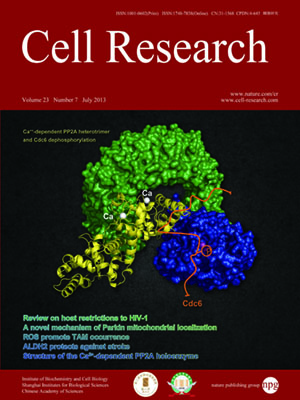
Volume 23, No 7, Jul 2013
ISSN: 1001-0602
EISSN: 1748-7838 2018
impact factor 17.848*
(Clarivate Analytics, 2019)
Volume 23 Issue 7, July 2013: 915-930
ORIGINAL ARTICLES
ALDH2 protects against stroke by clearing 4-HNE
Jin-Min Guo1,2,*, Ai-Jun Liu1,*, Pu Zang1, Wen-Zhe Dong1, Li Ying3, Wei Wang1, Pu Xu1, Xu-Rui Song1, Jun Cai4, She-Qing Zhang5, Jun-Li Duan6, Jawahar L Mehta7 and Ding-Feng Su1
1Department of Pharmacology, School of Pharmacy, Second Military Medical University, 325 Guo He Road, Shanghai 200433, China
2Jinan Military General Hospital, 25 Shi-fan Road, Jinan, Shandong 250031, China
3Department of Neurology, Xinhua Hospital, Shanghai Jiaotong University, 1665 Kongjiang Road, Shanghai 200092, China
4Department of Cardiology, Chaoyang Hospital, Capital Medical University, 8th Gongtinanlu Road, Chaoyang District, Beijing 100020, China
5Department of Neurology, Changhai Hospital, Second Military Medical University, 174 Changhai Road, Shanghai 200433, China
6Department of Gerontology, Xinhua Hospital, Shanghai Jiaotong University, 1665 Kongjiang Road, Shanghai 200092, China
7Division of Cardiology, University of Arkansas for Medical Sciences and the Central Arkansas Veterans Healthcare System, Little Rock, AR, USA
*These two authors contributed equally to this work.
Correspondence: Ai-Jun Liu, E-mail: mrliuaijun@163.comDing-Feng Su, Tel and Fax: (86)21-65493951(dfsu2008@gmail.com)
Aldehyde dehydrogenase 2 (ALDH2) is a mitochondrial enzyme that metabolizes ethanol and toxic aldehydes such as 4-hydroxy-2-nonenal (4-HNE). Using an unbiased proteomic search, we identified ALDH2 deficiency in stroke-prone spontaneously hypertensive rats (SHR-SP) as compared with spontaneously hypertensive rats (SHR). We concluded the causative role of ALDH2 deficiency in neuronal injury as overexpression or activation of ALDH2 conferred neuroprotection by clearing 4-HNE in in vitro studies. Further, ALDH2-knockdown rats revealed the absence of neuroprotective effects of PKCε. Moderate ethanol administration that is known to exert protection against stroke was shown to enhance the detoxification of 4-HNE, and to protect against ischemic cerebral injury through the PKCε-ALDH2 pathway. In SHR-SP, serum 4-HNE level was persistently elevated and correlated inversely with the lifespan. The role of 4-HNE in stroke in humans was also suggested by persistent elevation of its plasma levels for at least 6 months after stroke. Lastly, we observed that 21 of 1 242 subjects followed for 8 years who developed stroke had higher initial plasma 4-HNE levels than those who did not develop stroke. These findings suggest that activation of the ALDH2 pathway may serve as a useful index in the identification of stroke-prone subjects, and the ALDH2 pathway may be a potential target of therapeutic intervention in stroke.
10.1038/cr.2013.69
FULL TEXT | PDF
Browse 3075


